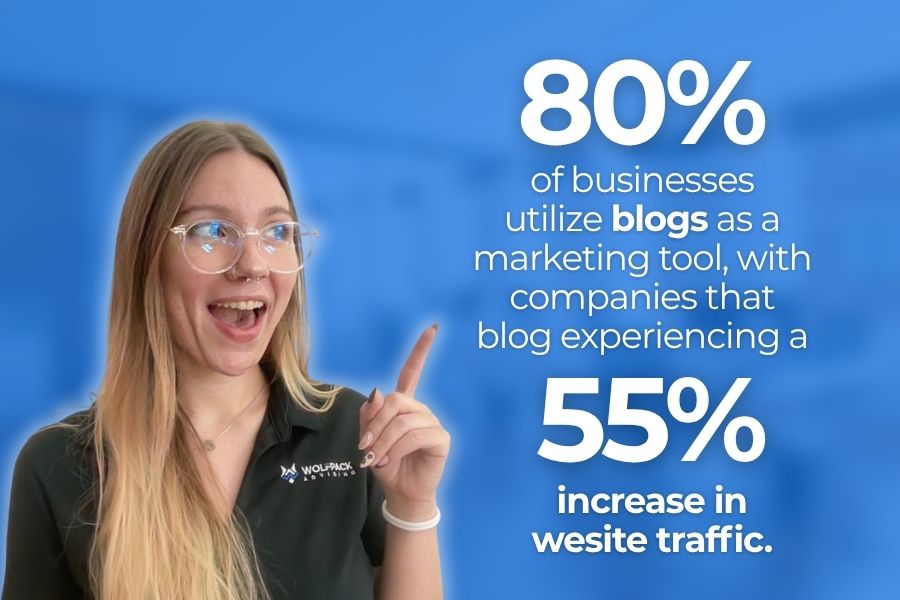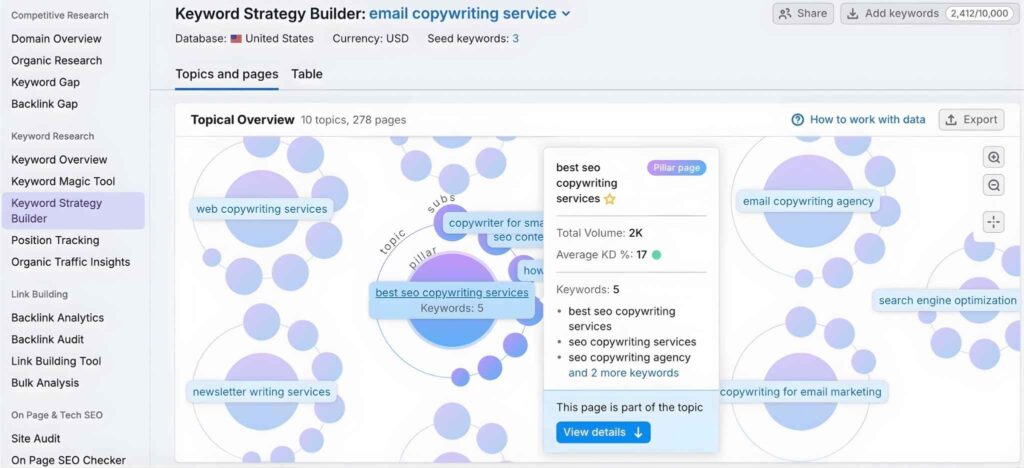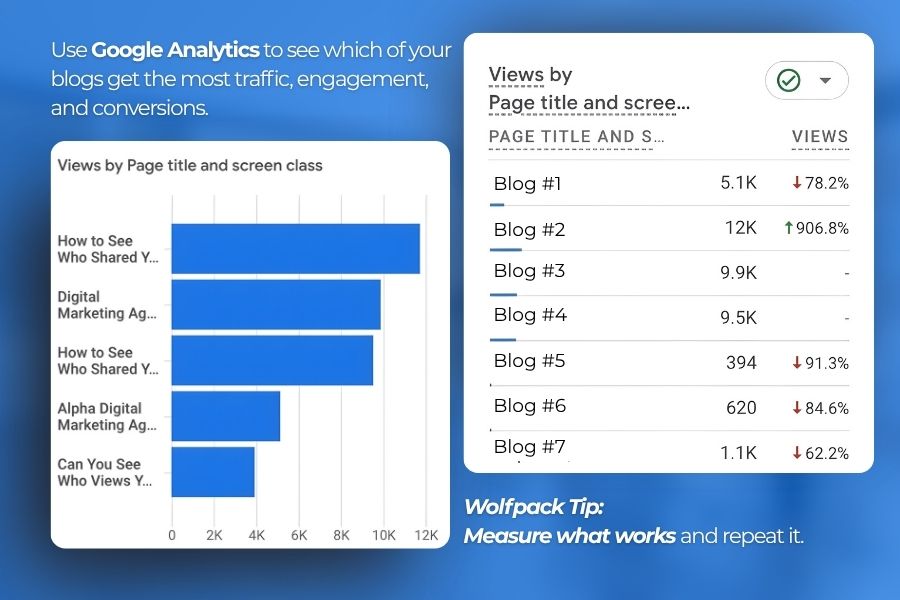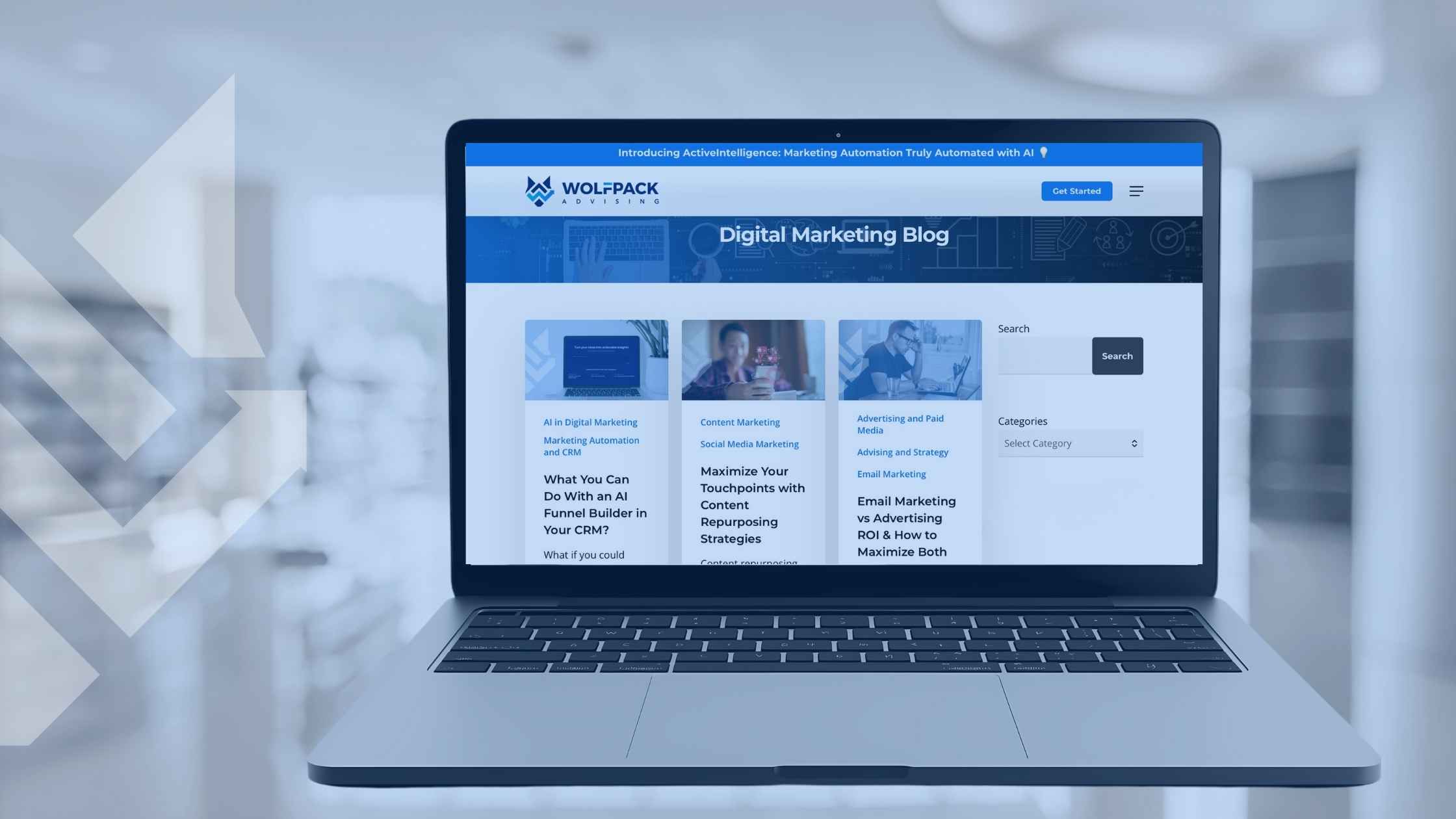Last updated on December 12th, 2025 at 03:37 pm
If you have ever stared at a blank screen wondering, “What should I blog about next?” you are not alone. Many business owners know blogging builds brand visibility, but few realize that the topics you choose are what truly drive success.
Blogging is not about filling your website with content. It is about creating valuable, customer-focused resources that help people solve real problems. When you do that consistently, your blog becomes more than just a marketing tool. It becomes a trust-building engine that works for you every day.
So, what makes a blog stand out in a crowded industry? It starts with understanding your audience, then choosing topics that educate, engage, and convert. In this guide, you will learn exactly how to pick the best topics to use in blogging that attract your ideal customers and keep them coming back.

Contents
Why Choosing the Right Blog Topics Matters for Business Owners
Your blog topics are the foundation of your content strategy.
Pick the wrong ones and your efforts will fall flat. Pick the right ones and you will naturally attract your target audience, establish authority, and grow your business without being a marketing expert.
Let’s look at two approaches side by side:
| Random Blog Topics | Strategic Blog Topics |
|---|---|
| “Our Office Renovation Story” | “How to Choose a Reliable HVAC Company Near You” |
| “Summer Update from Our Team” | “Top 5 Ways to Reduce Your Energy Bill This Year” |
| “Happy Holidays from Us” | “The Best Time of Year to Schedule Home Maintenance” |
The difference? Strategic blog topics solve real problems. They answer the questions customers are typing into Google and position your business as the expert who helps before you sell.
This approach builds brand trust and organic visibility, which means more traffic and higher-quality leads without constantly paying for ads.
How to Identify the Best Topics to Use in Blogging
The best blog ideas are hidden in plain sight within your inbox, conversations, and customer questions.
Start by asking yourself:
- What questions come up most before people buy?
- What myths or misconceptions exist about your industry?
- What problems do your customers face that you can solve through education?
These are not just ideas. They are powerful search topics.
You can validate them by using:
- AnswerThePublic: See what people are searching around your keywords.
- Google’s “People Also Ask” box: Discover related questions real users type in.
- Google Trends: Identify seasonal or rising interest topics in your industry.
💡 Pro Tip: Combine data with real-world insight. If customers keep asking the same thing during calls, that is your next blog post waiting to happen.
When you pick topics based on both search intent and customer need, you hit the sweet spot where blogging drives real growth.
Using Keyword Clustering to Identify the Best Blogging Topics
One of the most effective methods to select high-impact blog topics is keyword clustering, as practiced with tools like SEMrush. Rather than picking keywords individually, keyword clustering groups related search terms together, allowing you to see thematic connections and find broader topics that tap into multiple queries your audience is searching for.
For example, SEMrush’s Keyword Strategy Builder might highlight clusters such as “best SEO copywriting services,” which include several related keywords like “SEO copywriting services,” “SEO copywriting agency,” and similar terms.

create blogs that attract organic traffic.
By targeting these clusters rather than single keywords, you can create comprehensive, authoritative blog posts that address a wider set of search intents. This increases your chances of ranking for many keywords, attracts a more diverse audience, and makes your content stand out as a go-to resource in your industry.
Using AI in Blogging the Right Way
AI can be a powerful assistant for business owners who want to blog more efficiently without sacrificing quality. Tools like ChatGPT make it easier to brainstorm ideas, outline posts, and even generate first drafts. However, AI should be used as a support tool, not a replacement for your expertise.
When used correctly, AI can help streamline your content process by suggesting keywords, identifying trending topics, and improving readability. Yet, the real impact comes from the human touch. Your personal insights, experiences, and voice resonate with readers and reflect your brand.

Here’s how to get the best results when using AI for blogging:
- Start with AI for ideation: Use it to generate topic ideas or identify search trends related to your industry.
- Edit with personality: Always review and refine AI-generated text so it sounds like you and not a machine.
- Add real examples: Include client stories, results, or lessons learned to make your blogs unique.
- Stay authentic: Let AI handle structure and optimization, while you focus on storytelling and authenticity.
Example:
A business owner writing a blog about “The Benefits of Hiring a Local Contractor” can use AI to outline sections and find statistics, but the final story should include personal experiences and customer success examples.
Using AI effectively helps you save time while producing authentic, high-quality content that strengthens your brand’s credibility.
Use the ChatGPT prompt below to quickly generate creative, SEO-friendly topics for your business.
You are an expert content strategist and SEO writer. Generate 10 blog post ideas based on the following details:
- Industry/Niche: [insert industry or topic, e.g., real estate, fitness, marketing]
- Target Audience: [insert target audience, e.g., small business owners, first-time homebuyers, busy professionals]
- Goal: [e.g., attract website traffic, build authority, generate leads, educate customers]
- Tone or Style: [e.g., conversational, professional, storytelling, data-driven]
- Keywords: [insert keywords or phrases]
The Best Topics to Use in Blogging
Choosing the best topics to use in blogging can transform how your business connects with potential customers. The right topics not only showcase your expertise but also help your content stand out in search results. Below, we break down three main types of blog topics that can help you build authority, engage your audience, and drive conversions.
Authority-Building Blog Topics
Authority topics position your business as the expert in your space. They show readers and Google that you know your stuff.
Some authority-building topic examples:
- How-to guides: “How to Tell If Your Roof Needs a Repair or Replacement”
- Case studies: “How One Local Business Increased Leads by 60% With SEO”
- Industry explainers: “What Every Homeowner Should Know About HVAC Maintenance”
- Opinion pieces: “Why Cheap Services End Up Costing More in the Long Run”
These posts do more than share facts. They build credibility. Over time, consistent authority-based content becomes what Google calls experience and expertise signals.
If WolfPack were writing this for a local service client, we would include screenshots of analytics results, client quotes, or success stories to reinforce trust.
Engagement-Driven Topics
Great blogs do not just inform. They connect. Engagement-driven topics are about showing personality, building relationships, and sparking conversation.
To make your content more engaging:
- Tell stories. Share how your business solved a customer’s problem.
- Use relatable language. Write as if you are talking to a friend, not a textbook.
- Add human moments. People relate more to stories than statistics.
Example: Instead of writing “The Importance of Water Heater Maintenance,” try “How One Homeowner Avoided a $2,000 Plumbing Disaster With a 10-Minute Check.”
See the difference? One educates. The other engages.
Conversion-Focused Topics
Blogging is part of your sales funnel even if you are not selling directly on the page.
Certain blog topics help move readers from browsing to buying.
Here is a framework you can follow:
| Funnel Stage | Blog Topic Example | Goal |
|---|---|---|
| Awareness | “How to Know If You Need a New AC System” | Educate new visitors |
| Consideration | “DIY vs. Professional Installation: What’s Worth It?” | Compare solutions |
| Decision | “Why Our Clients Choose [Your Business Name] for Reliable Service” | Build confidence to buy |
When you align your blog topics with your buyer’s journey, your content starts working with your sales strategy instead of separately from it.
And do not forget your soft CTAs, such as:
- “Want to see how this applies to your business? Contact us for a free consultation.”
- “Need help implementing this? Schedule a strategy call today.”
They guide readers naturally without being pushy.
How Often Should You Blog to Stay Visible in Your Industry
Blogging does not have to take over your week. It just needs a system.
Consistency matters more than quantity.
For most small businesses, two to four high-quality blogs per month is perfect.
That pace lets you focus on writing useful content while keeping Google’s attention.
Try balancing:
- Evergreen posts that always attract traffic.
- Seasonal posts tied to events, holidays, or trends.
For example, a landscaping company might post:
- “Spring Yard Cleanup Checklist” in March, and
- “How to Protect Your Lawn Before Winter” in October.
This rhythm keeps your blog relevant year-round and gives customers reasons to return.
Common Mistakes Business Owners Make When Choosing Blog Topics
Even the best blogs can fail when they fall into these traps:
- Blogging only about yourself. Customers care about how you can help them, not your internal updates.
- Skipping keyword research. Without SEO basics, your post may never reach readers.
- Writing inconsistently. One great post every six months will not drive results.
- Overcomplicating topics. Write for clarity, not complexity.
- Giving up too early. Blogging success builds over time, so stay consistent.
Real Examples of the Best Topics to Use in Blogging (Across Industries)
Here is how effective blog topics look across different industries:
| Industry | Example Topic | Why It Works |
|---|---|---|
| HVAC | “How to Tell If You Need a New AC Unit” | Solves a common homeowner concern. |
| Law Firm | “What to Do After a Minor Car Accident” | Builds authority and trust. |
| Dental Office | “Top 5 Signs You Might Need a Deep Cleaning” | Educates patients simply. |
| Real Estate | “Should You Sell Your Home in Winter?” | Addresses seasonal questions. |
| E-commerce | “How to Choose the Right Size When Shopping Online” | Solves a purchase pain point. |
| Marketing Agency | “How to Pick the Right SEO Partner” | Attracts decision-makers directly. |
The takeaway: the best topics focus on customer intent.
Each example answers a question buyers already have, which is exactly what Google rewards.
How to Get Started with Blog Topics That Work for Your Business
If blogging feels overwhelming, start small. Here is a simple 4-step process any business owner can follow:
- Brainstorm: Write down your top 10 most common customer questions.
- Validate: Use Google’s “People Also Ask” or a keyword tool to confirm search interest.
- Plan: Create a 3-month calendar mixing evergreen, seasonal, and educational topics.
- Measure: Track which posts get the most traffic, engagement, or inquiries.
Over time, this system helps you refine your topics and focus on what actually drives results.

If you prefer to skip the trial and error, WolfPack’s content strategy team can help plan and execute your blog topics designed to attract, engage, and convert.
Related Questions
How often should a business publish new blog posts?
Consistency matters more than frequency. Most small businesses see strong results by publishing one to four quality posts per month. Focus on value and relevance rather than rushing to post every week.
What makes a blog topic successful?
A successful blog topic solves a real problem or answers a common question your audience has. It should align with your services, include keywords your customers search for, and offer clear, helpful takeaways.
Can AI really help with blogging?
Yes, AI tools can save time on research, outlining, and brainstorming ideas. However, human editing is essential. AI like ChatGPT works best when combined with your experience and brand voice to create content that feels authentic and trustworthy.
How do I know if my blogs are performing well?
Track metrics like page views, engagement rate, time on page, and conversions using tools like Google Analytics. High-performing posts usually attract consistent traffic, generate leads, or get shared often.
Should I hire a marketing agency to write my blogs?
If you want to save time and ensure your content strategy supports business growth, partnering with a marketing agency is a smart move. Agencies like WolfPack handle topic planning, SEO optimization, and writing, allowing you to focus on running your business.
Conclusion
The best topics to use in blogging are not about chasing trends. They are about creating helpful, consistent content that connects with your audience and builds trust over time.
Writing effective blogs takes time and strategy, and that is where WolfPack can help. Our team can plan and write content that fits your goals while freeing you to focus on running your business. Working with a marketing agency helps you streamline your content process and ensures your blogs are optimized to perform.
If you are ready to make your blog a stronger part of your marketing strategy, WolfPack is here to help you create content that stands out, builds trust, and supports long-term growth.






